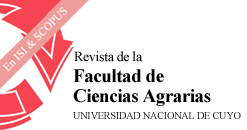Artículo de revista
Scientific contributions of agroecology in Latin America and the Caribbean
a reviewContribuciones científicas de la agroecología en América Latina y el Caribe
una revisión
Gallardo-López, Felipe
Colegio de Postgraduados (México). Campus Veracruz. Posgrado en Agroecosistemas Tropicales.
-  Enviar un email al autor
Enviar un email al autor
Hernández-Chontal, Mario Alejandro
Colegio de Postgraduados (México). Campus Veracruz. Posgrado en Agroecosistemas Tropicales.
-  Enviar un email al autor
Enviar un email al autor
Linares-Gabriel, Ariadna
Colegio de Postgraduados (México). Campus Veracruz. Posgrado en Agroecosistemas Tropicales.
-  Enviar un email al autor
Enviar un email al autor
Cisneros-Saguilán, Pedro
Instituto Tecnológico de Pinotepa (México). Departamento de Ciencias Agropecuarias.
-  Enviar un email al autor
Enviar un email al autor
Publicado en el 2019 en
Revista de la Facultad de Ciencias Agrarias,
Vol. 51, no. 1
Idioma:
Inglés
Resumen:
Inglés
A systematization and a quantitative and qualitative analysis of scientific documents
are presented, which respond: What are the main contributions of research in relation
to the demands of agroecology in Latin America and the Caribbean (LAC)? What factors
approaches and methods have been used in time and space? The quantitative approach
predominates, followed by the qualitative one, and the mixed one to a lesser extent. The
development of agroecology in LAC is distributed in: a country with greater consolidation
(Brazil), a larger group in development, another with initial contributions and,
finally, one with minimal contributions. The most considered factors in the investigations
are the physical-biological ones, followed by the social, economic, cultural, and
political ones. Two thirds of the contributions to agroecological demands were: agroecological
management, maintenance of biodiversity, self-management and local self-sufficiency,
and soil and water conservation. Some contributions have been intensified at
present, while agroecological management has prevailed over time. The predominance
of conventional research approaches, methods and techniques is evident; the challenge
is to generate new ways of seeing and doing research, which allow addressing the disciplinary
interfaces of the complex problem in the society-nature relationship.
Español
Se presenta una sistematización y análisis cuantitativo y cualitativo de documentos
científicos, que responden ¿Cuáles son los principales aportes de las investigaciones en
relación con las demandas de la agroecología en América Latina y el Caribe (ALC)? ¿Qué
factores, enfoques y métodos han utilizado en tiempo y espacio? Predomina el enfoque
cuantitativo, seguido del cualitativo y menormente el mixto; el desarrollo de la agroecología
en ALC está distribuido en: un país con mayor consolidación (Brasil), un grupo más grande
en desarrollo, otro con aportaciones iniciales y, finalmente, uno con mínimos aportes.
Los factores más considerados en las investigaciones son los físico-biológicos, seguido
de los sociales, económicos, culturales y políticos. Las dos terceras partes de los aportes
a las demandas agroecológicas fueron: manejo agroecológico, mantenimiento de la biodiversidad,
autogestión y autosuficiencia local y conservación de suelo y agua. Algunos
aportes se han intensificado actualmente, mientras que el manejo agroecológico ha prevalecido
a través del tiempo. Es evidente el predominio de enfoques, métodos y técnicas de
investigación convencionales; el reto es generar nuevas formas de ver y hacer investigación,
que permitan abordar las interfaces disciplinares de la compleja problemática en la relación
sociedad-naturaleza.
Disciplinas:
Palabras clave:
Descriptores:
Gallardo-López, Felipe; Hernández-Chontal, Mario Alejandro; Linares-Gabriel, Ariadna; Cisneros-Saguilán, Pedro (2019) "Scientific contributions of agroecology in Latin America and the Caribbean: a review". En: Revista de la Facultad de Ciencias Agrarias, Vol. 51, no. 1, p. 215-229.
Dirección URL del artículo: https://bdigital.uncu.edu.ar/13689.
Fecha de consulta del artículo: 24/05/25.

Este obra está bajo una Licencia Creative Commons Atribución-NoComercial-CompartirIgual 3.0 Unported.
Conozca más sobre esta licencia >


